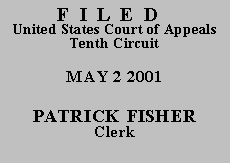

|
JOHNNY AUSTIN, |
|
Before HENRY, BRISCOE, and MURPHY, Circuit Judges.
This matter is before the court on Johnny Austin's pro se request for a certificate of appealability ("COA"). Austin seeks a COA so he can appeal the district court's dismissal of his 28 U.S.C. § 2254 petition. See 28 U.S.C. § 2253(c)(1)(A) (providing that no appeal may be taken from a final order disposing of a § 2254 petition unless the petitioner first obtains a COA). Austin also seeks to proceed in forma pauperis on appeal. Because Austin has not made a substantial showing of the denial of a constitutional right, he is not entitled to a COA and his appeal is dismissed. See id. § 2253(c)(2).
Austin was convicted in Oklahoma state court of manslaughter in the first degree and child beating. It is clear from the record that Austin's conviction became final before April 24, 1996. Austin filed an application for post-conviction relief with the state district court on December 26, 1995. The state district court denied the application and the Oklahoma Court of Criminal Appeals affirmed the denial on May 13, 1996. Austin did not file the instant § 2254 habeas petition until July 26, 2000. The petition was referred to a magistrate judge for initial proceedings pursuant to 28 U.S.C. § 636(b)(1)(B).
On September 21, 2000, Respondent filed a motion to dismiss Austin's habeas petition and a brief in support thereof. Because Austin's Oklahoma state conviction became final prior to the enactment of the Antiterrorism and Effective Death Penalty Act ("AEDPA"), Respondent argued that Austin's § 2254 petition should have been filed prior to April 24, 1997. See Adams v. LeMaster, 223 F.3d 1177, 1180 (10th Cir. 2000) (reiterating that a state prisoner generally has one year from the effective date of the AEDPA to file a § 2254 habeas petition). Respondent conceded that the one-year limitations period was tolled for a period of nineteen days while Austin's application for state post-conviction relief was pending before the Oklahoma Court of Criminal Appeals, but argued that the § 2254 petition should, therefore, have been filed no later than May 12, 1997. See Hoggro v. Boone, 150 F.3d 1223, 1226 (10th Cir. 1998) (holding that one-year limitations period is tolled during the period of time petitioner spends properly pursuing state post-conviction relief). Respondent then argued that Austin's petition was time-barred because it was not filed until July 26, 2000.
Austin filed a response to the motion to dismiss. In that response, he did not assert that his petition was timely, but argued that the one-year AEDPA statute of limitations should be equitably tolled because he had no access to necessary legal materials until he was transferred to the Lawton Correctional Facility in December 1999. Austin also made an unsupported allegation that he was actually innocent of the crimes to which he pleaded guilty.
In her report and recommendation, the magistrate judge relied, in part, on this court's decision in Miller v. Marr, 141 F.3d 976, 978 (10th Cir. 1998), to conclude that Austin had failed to identify any circumstances that would support an equitable tolling of the limitations period. The report and recommendation also noted that Austin's § 2254 petition was filed more than seven months after he obtained access to the legal materials at the Lawton Correctional Facility. The magistrate concluded that Austin had not diligently pursued his federal claims and, therefore, was not entitled to equitable tolling. See Marsh v. Soares, 223 F.3d 1217, 1220 (10th Cir. 2000) (holding equitable tolling "is only available when an inmate diligently pursues his claims and demonstrates that the failure to timely filed was caused by extraordinary circumstances beyond his control").
Austin filed timely objections to the report and recommendation. Although the district court considered Austin's objections, the court adopted the report and recommendation and dismissed Austin's § 2254 petition.
In his application for a COA, Austin does not argue that the magistrate judge miscalculated the one-year period. Instead, Austin renews the argument made in his objection to the report and recommendation that his inability to access legal materials supports the tolling of the one-year limitations period.
Before he is entitled to a COA, Austin must make a "substantial showing of the denial of a constitutional right." 28 U.S.C. § 2253(c)(2). Austin may make this showing by demonstrating the issues raised are debatable among jurists, a court could resolve the issues differently, or that the questions presented deserve further proceedings. See Slack v. McDaniel, 529 U.S. 473, 483-84 (2000). This court has reviewed Austin's application for a COA, his appellate brief, the magistrate judge's report and recommendation, the district court's order dated December 8, 2000, and the entire record on appeal. That review clearly demonstrates the district court's dismissal of Austin's § 2254 petition as untimely is not deserving of further proceedings or subject to a different resolution on appeal. Accordingly, this court denies Austin's request for a COA for substantially those reasons set forth in the district court's order and the magistrate's report and recommendation and dismisses this appeal. Austin's request to proceed on appeal in forma pauperis is granted.
ENTERED FOR THE COURT:
Michael R. Murphy
Circuit Judge
*. This order and judgment is not binding precedent, except under the doctrines of law of the case, res judicata and collateral estoppel. The court generally disfavors the citation of orders and judgments; nevertheless, an order and judgment may be cited under the terms and conditions of 10th Cir. R. 36.3.